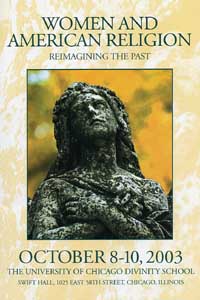Historians to reveal those absent from religion’s story
By Seth SandersNews Office
 |
To address this gap, more than 40 historians will gather for a conference at the University’s Divinity School from Wednesday, Oct. 8 through Friday, Oct. 10.
Presenters at the conference, titled “Women and American Religion: Reimagining the Past,” will introduce a group of women who largely have been absent in the story of American religious history. This group includes slave evangelists, Mormon wives, “witches,” Protestant health reformers, Native American converts, black nuns and women rabbis. Most importantly, speakers will explore how understanding women’s history changes our picture of America and its religious life.
“The formal leaders in American religions were mostly men, but the informal leaders were mostly women,” said Catherine Brekus, Associate Professor in the Divinity School and organizer of the conference. “Yet these people, who ran many of the churches’ vital functions and filled the pews, have usually been ignored by historians.
“The complaint is that there’s been a tremendous amount of work on women’s history, but it hasn’t been incorporated into textbooks. Does this mean we need to rewrite them? Yes, but it hasn’t happened. So we’re seeing what we can do to change that.
“This will be a concentrated couple of days when people working in the field can concentrate on changing standard narratives of American religious history.”
The three-day conference will describe the lives of women, who often were at the heart of many important religious controversies but just as often forgotten. The speakers will introduce historical characters many have never imagined and the striking questions they raise. Such people and questions include: Why did ministers accuse Colonial American women of being “addicted to revelations?” Elizabeth Reis, University of Oregon, will explore how these women’s experiences of God threatened male preachers’ authority, provoking one of the first great controversies in the American church.
Did Catholics sing spirituals? We often think of Catholicism arriving with Irish immigrants. Emily Clark, Lewis and Clark College, will introduce the southern black women who made up the majority of America’s first Catholics. Why were women of the Church of God in Christ known as “unrespectable saints”? Anthea Butler, Loyola Marymount University, will look at African-American women’s struggles to overcome negative stereotypes.
Who was “the girl rabbi of the golden West,” and why was she forgotten? Pamela Nadell, American University, will talk about discovering the women who made American Jewish history.
“Ultimately,” said Brekus, “we want to ask how women’s history changes our understanding of religious history in America.”
A full program and registration information are available at http://womenandreligion.uchicago.edu. The free conference will be held in the third-floor lecture hall of Swift Hall at 1025 E. 58th St.
![[Chronicle]](/images/sidebar_header_oct06.gif)